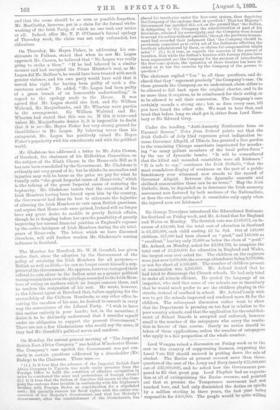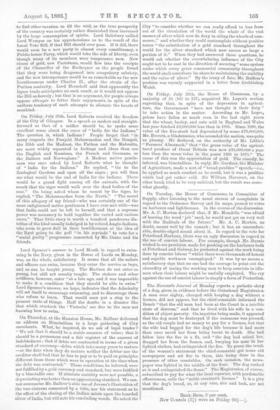Lord Wemyss raised a discussion on Friday week as to
the cost to the country of suppressing licences, supposing the Local Veto Bill should succeed in putting down the sale of alcohol. The Excise at present covered more than three- quarters of the cost of the Army and Navy (nearly 225,000,000 out of £32,000,000), and he asked how the Government pro- posed to fill that great gap. Lord Playfair had no expecta- tion at all of extinguishing the Excise revenue, and pointed out that at present the Temperance movement had not touched beer, and had only diminished the duties on spirits by a million sterling in three years, the last year being responsible for £400,000. The people would be quite willing to find other taxation to fill the void, as the true prosperity of the country was certainly rather diminished than increased by the large consumption of spirits. Lord Salisbury rallied Lord Wemyss on his apprehensions as to the result of the Local Veto Bill, if that Bill should ever pass. If it did, there would soon be a new party in almost every constituency, a Public-house Party, which would take the side of liberty, even though many of its members were temperance men. New rivers of gold, new Paetoluses, would flow into the receipts of the Chancellor of the Exchequer as the people found that they were being dragooned into compulsory sobriety, and the new intemperance would be as remarkable as the new licentiousness under Charles IL, after the strain of the Puritan austerity. Lord Herechell said that apparently the liquor trade anticipates no such result, or it would not oppose the Bill so fiercely; but that is no argument, for people always oppose attempts to fetter their enjoyments, in spite of the uniform tendency of such attempts to alienate the hearts of mankind.



































 Previous page
Previous page